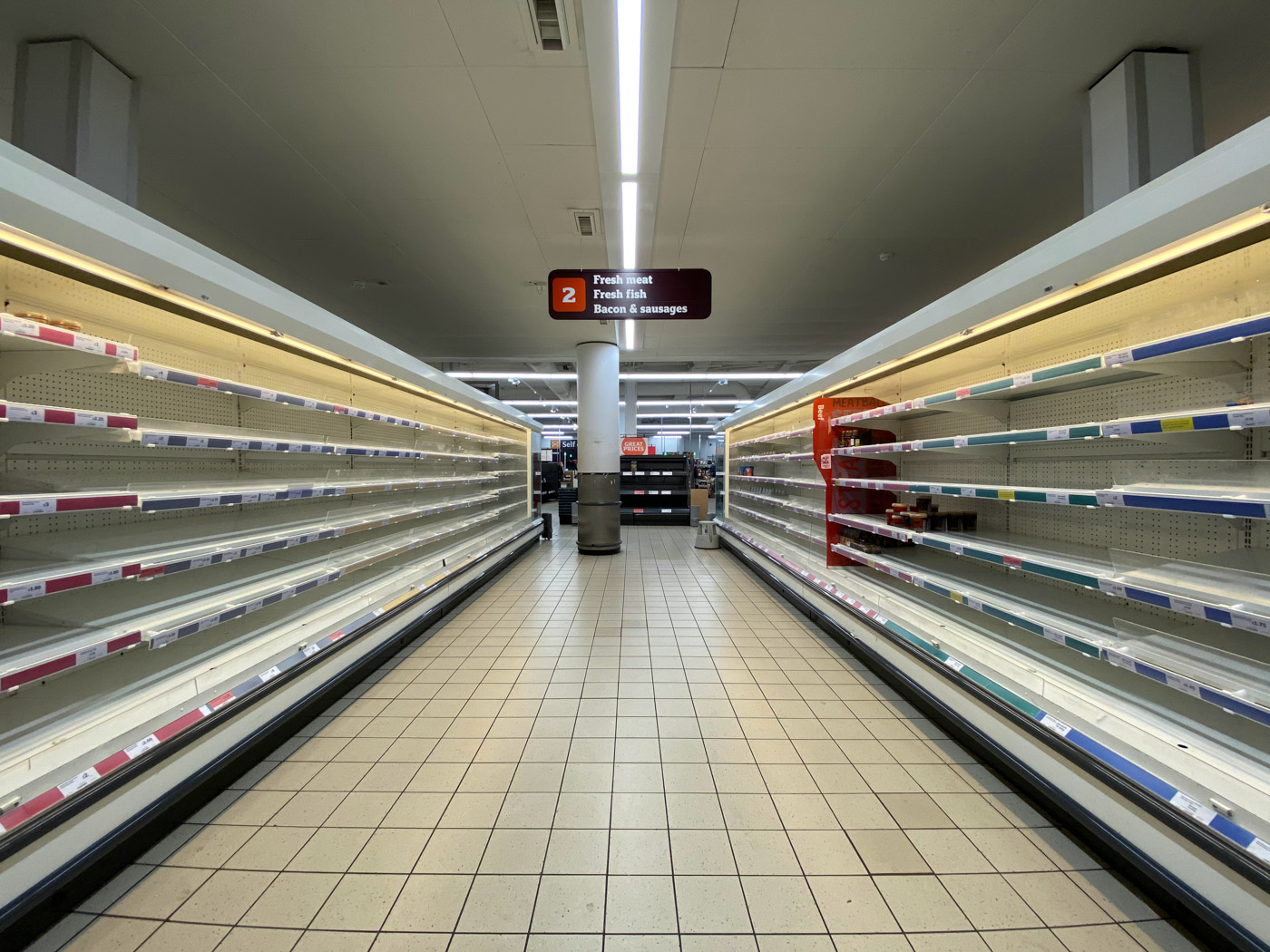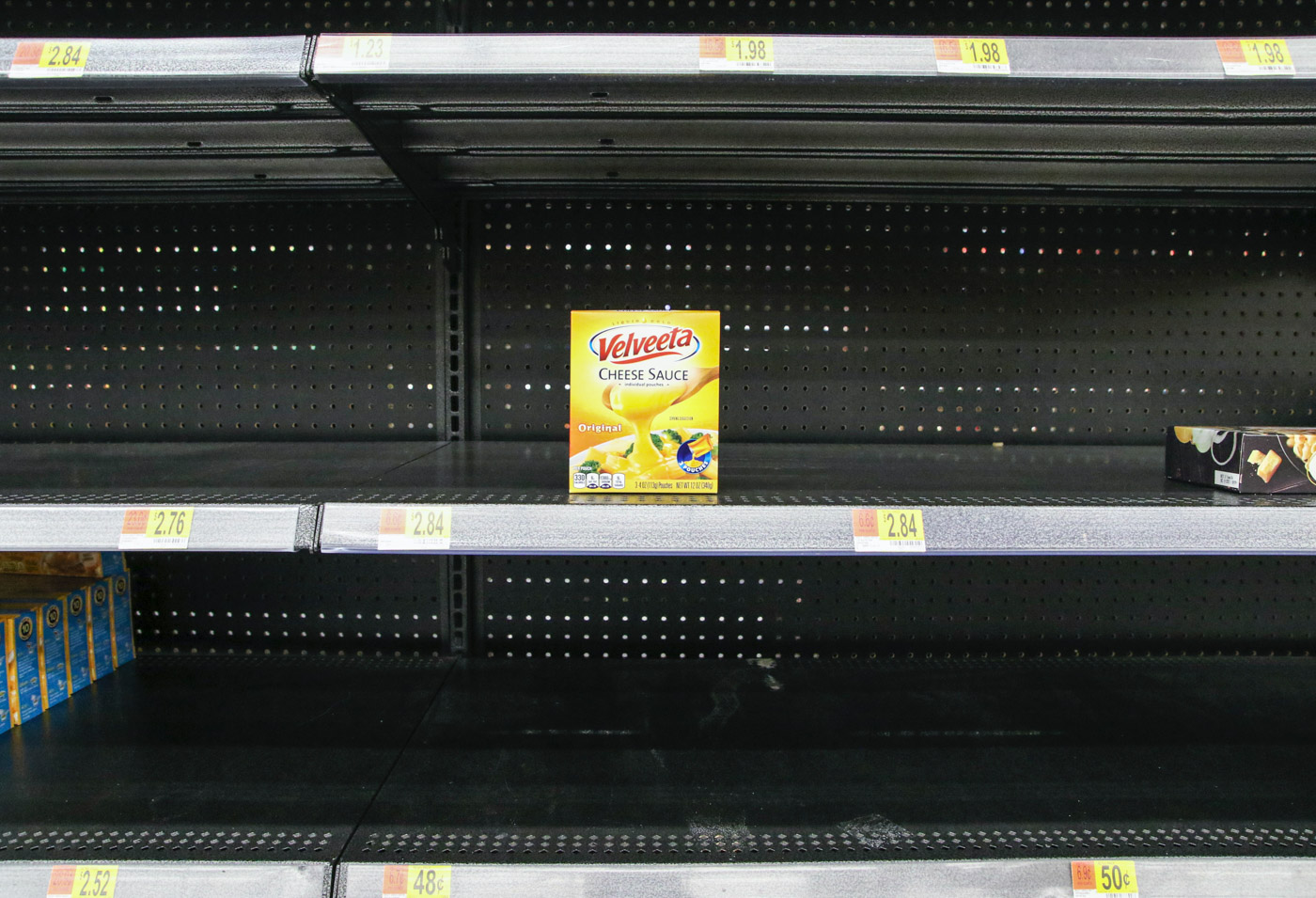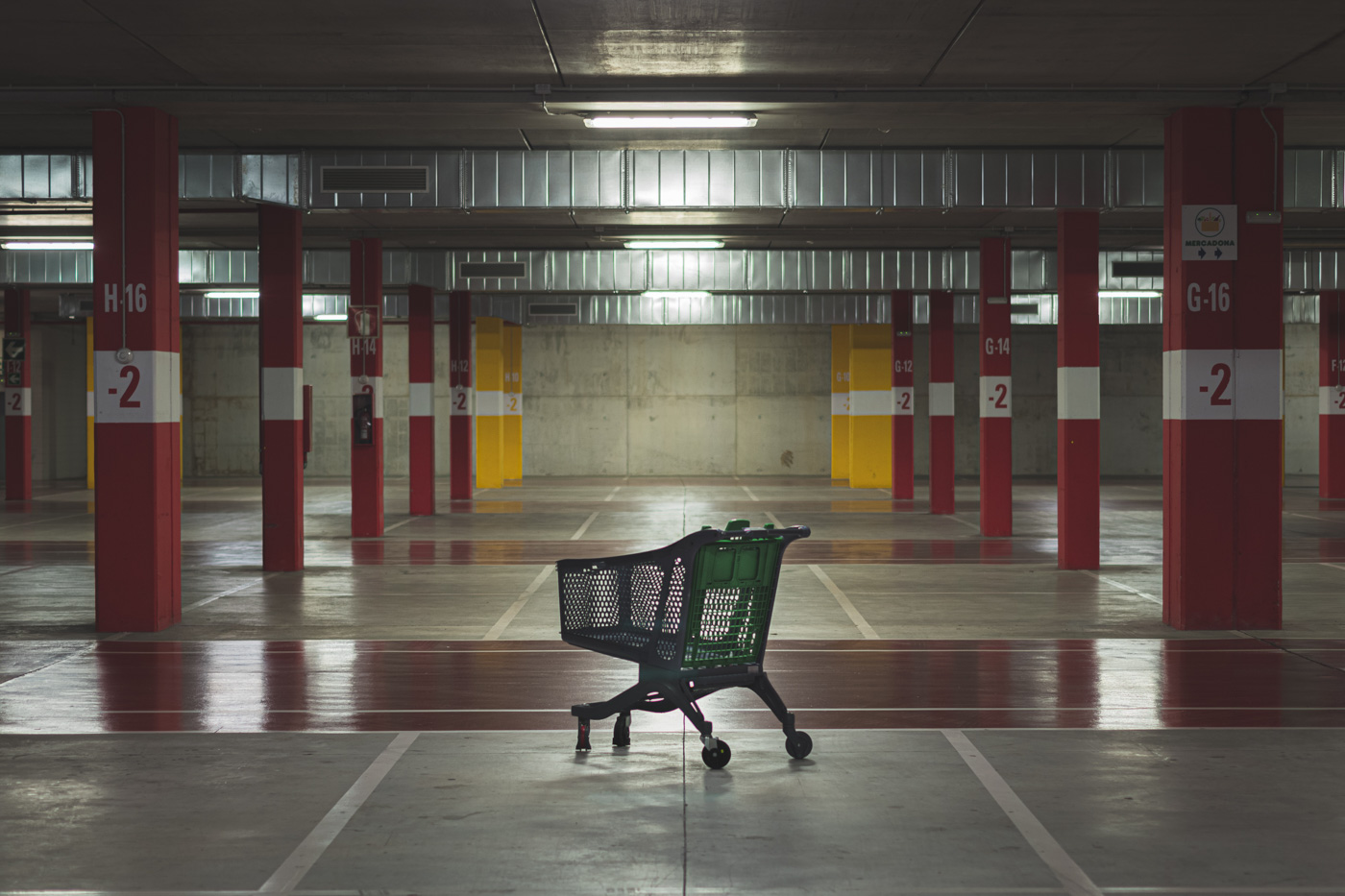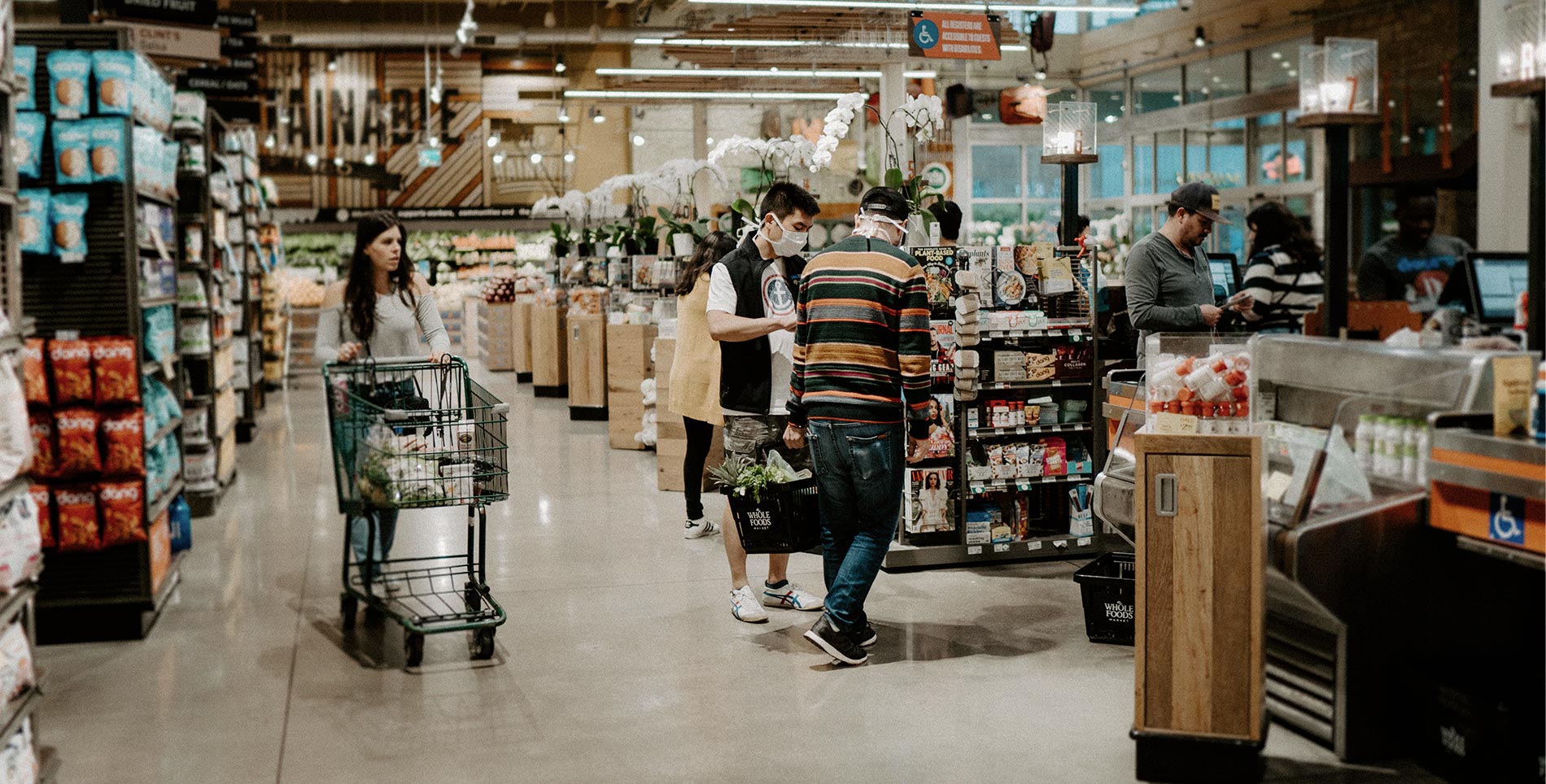Grocery stores and supermarkets are known for abundance, with rows of brightly packaged cereals, shiny, picture-perfect produce, and collections of local breads and baked goods. Over the past three weeks, however, the landscape of the grocery store has changed along with everything else, with the contrast between empty shelves and overflowing carts becoming stark.
As restaurants and other businesses have shuttered their doors, citizens are increasingly isolated as shelter in place orders and public health mandates have taken effect. The grocery store, deemed an essential business and protected from such mandates, has become both a last haven of normalcy and a battleground on the frontlines of the coronavirus pandemic. Cashiers, stockers, and other grocery store employees are an unexpected addition to the list of essential personal, which includes nurses, first responders, and sanitation workers. But frequent reports of strikes and sick-outs make it finally clear just how important our grocery stores, and the workers within them, are.
“I have sixteen years in the grocery store business. This is unlike anything else we’ve ever experienced,” says Gina, who works at a large grocery store chain in California but asked to remain anonymous. “It just happened so fast. It was hell on earth to be at that store.” As the novel coronavirus spread to the United States after months of being largely ignored in the media, grocery store employees found themselves at the center of the conflict. Angry, anxious shoppers overwhelmed stores in a matter of days, and cashiers were finding themselves wading through long lines of $700 orders all while staffed for a typical March weekday.


“There have been times during the day that I just look up and we all look like zombies, when the lines are non-stop,” Yulia Santos, employee of Pemberton Farms, and independently owned grocery store Massachusetts, observes. She felt blindsided by the surge of shopping that accompanied the pandemic’s spread in early March, and looked to her own customers to guide how to prepare. “I was feeling irresponsible because I wasn’t making huge purchases of food. It was worrying to see myself not worry about the situation as much.” Individual purchases skyrocketed across the country as shoppers tried to assert control in an uncontrollable situation.
Most Americans have been trained in some sort of disaster preparedness; whether for fire, hurricane, blizzard or flood, it’s become common practice to stock up on pantry items and dry goods in case services are interrupted. This disaster, however, is unlike anything we’ve been taught to prepare for. The power has stayed on, the sun is still shining, and the grocery stores have stayed open.
In addition to the added responsibilities of crowd control and increased sanitation that these workers are taking on to protect themselves and others, they are also a friendly face and play an important role in comforting many shoppers. “People are still frantic and they’re coming in for answers, and they’re asking us when we think it’s going to end,” says Gina. “We’re just as worn out and distraught. It’s hard to try to be strong for these strangers who just need a reassuring thought.” Reassurance may simply be offering an alternative ingredient for something unavailable, or sharing the latest news of the pandemic. These workers have become hospitality professionals in a way they may have never before considered.
Shoppers now both treasure and dread a weekly trip to the grocery store during a quarantine that looks to only be increasing in both severity and length. For many, the store is a break in the monotony of isolation, a reason to leave the house, and a chance to stock up on comfort foods in a time of immense stress. However, that comes with the risk of exposure, and the uncertain sanitation of a heavily trafficked public space. Fear manifests itself in different ways—as a passive aggressive outburst over who snagged the last toilet paper that Gina had to mediate in the checkout line, or a confrontation between Yulia and a shopper who didn’t want to touch the pin pad to sign for their transaction.
For Gina and other long-time workers in the business, this has led to a new kind of acknowledgement for the work they do. “A grocery store employee is overall a thankless job. You get used to being treated poorly by a good amount of people on a regular basis,” she explains. Suddenly, cashiers and stockers are appreciated for keeping their customers fed. Shoppers are thanking them for coming to work, sometimes with tears in their eyes. “It makes you think outside yourself. I am doing something that is helping people out, and this job is really important,” Gina shared. As so many other services have been stripped away, we have begun to realize how important these people are to feeding us and ensuring our health.
The health of grocery workers is an entirely different consideration. Mary Chapman, who owns and operates The Cheese Shop of Portland in Portland, Maine, shares her ongoing confusion when faced with the overwhelming flood of information over the past weeks. “It’s hard to know what are the right choices,” she says. “We reevaluate our processes every single day.” Stores are scrambling to find ways to protect both shoppers and workers, from laying tape to indicate proper social distancing on the floor in lines to installing plexiglass splash shields at checkout.


But even extreme measures only go so far when people are streaming through the doors daily. “We’ve had people cough in our faces without covering their mouths,” says Mary. “I don’t want that happening to my employees.” The responsibility is difficult to juggle. Stores feel obligated to serve their communities and need employees behind the counter, but individuals feel trapped between their obligations to their employer and their own personal health, not to mention concern for their coworkers. “[Other people are] being told to stay home while we’re being encouraged to come in, and stay overtime if we can,” explains Gina. “There are days that I feel a strange anxiety I’ve never felt before coming to work. At the same time, I think about the rest of my team who are going to show up, and I want to show up for them.”
As a store owner and purchaser, Mary also feels a responsibility to her greater community. “The encouragement of any more person-to-person contact right now just feels hard, but we do want to stay a viable business,” she says. “If we stop selling the local cracker maker’s crackers, or the local cheesemaker’s cheese, then they get impacted too. It’s not just about our bottom line, but that of many.”
Meanwhile, shoppers are seeking new options as their normal supplies become more difficult to find. “When the big grocery stores are running out of stuff, they’ll come to us,” Mary says. “We can’t be anybody’s savior, but we can contribute a little bit here and there and help people out, whether it’s helping consumers or helping suppliers.”
Gina, in talking about the rollercoaster of the past few weeks, says, “in so many ways, this experience is going to change people and the way that they shop forever.” As people around the world are evaluating what is truly essential, it’s becoming increasingly clear that grocery stores are so much more than tempting colors lining the shelves. They help us celebrate, give us comfort, and at the very least, nourish us in times of need.







Our comments section is for members only.
Join today to gain exclusive access.